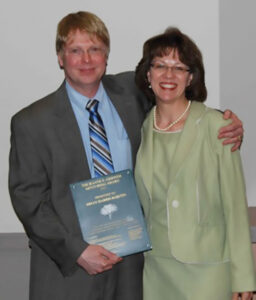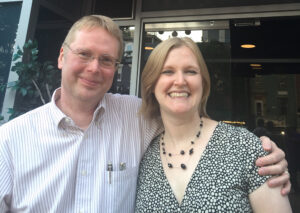Brian at OMB
In 2013, both Grace Medley and Shelly Martinez nominated Brian Harris-Kojetin to receive the Jeanne E. Griffith Mentoring award. Medley wrote the following in honor of her mentor, Brian Harris-Kojetin.
Like Madonna or Cher, Brian Harris-Kojetin is often referred to as just “Brian,” as in “I have a question; let’s call Brian.” No one ever asks which Brian, because for those of us in the federal statistical system, there is only one Brian. Brian Harris-Kojetin, aka “Brian at OMB” (U.S. Office of Management and Budget). And even though Brian is now deputy director of the Committee on National Statistics (CNSTAT) at the National Academy of Sciences, I’m not sure “Brian at CNSTAT” will ever catch on quite the same way.I’ve known Brian for more than 10 years now. I met him when I was a graduate student in the Joint Program in Survey Methodology. One of my fellow students had an internship with “Brian at OMB,” so we all got to know Brian and, before long, I was taking care of his dog whenever he and his wife, Lauren, traveled. Since then, I have worked with him on several interagency workgroups and served with him as an ASA Government Statistics Section officer and a detailee to the OMB.
Many of these collaborations were because Brian saw a need and not so gently persuaded me to join the cause. In talking to others in the field, I find I am not alone when I attribute many of my choices and opportunities to Brian. As a colleague at OMB stated, “Brian doesn’t formally supervise staff, but he has no trouble finding folks to mentor. Brian has the innate ability to establish relationships with many individuals in a variety of roles and is able to see how they can benefit from and help to address needs of the federal statistical community at the same time.” In other words, Brian has led many of us through the wilderness of survey production and statistical research and has not only made our work better, but made each of us better along the way.
Brian is originally from Edina, Minnesota, and holds a BA from the University of Denver in psychology and religious studies. His PhD is in social psychology with a minor in statistics from the University of Minnesota. He will tell you he can’t imagine what his life and career would be like without the incredible people who have mentored him in college and in the federal statistical system.
His enthusiasm for empirical research and statistics was instilled and cultivated by a mentor in his senior year at Denver. Bernard (Bernie) Spilka set high expectations for Brian. Before long, they were poring over SPSS printouts, co-authoring professional conference presentations, and publishing journal articles. Bernie introduced Brian to prominent researchers and made him feel part of the professional community. To Brian, Bernie was the mentor who inspired him to help others and give them opportunities to grow and thrive like he had been given.
After graduate school, Brian expected to be an academic—teaching psychology, statistics, and research methods at a small liberal arts college—but he couldn’t imagine being at the couple of colleges where he received offers. So, he applied for a job at the Bureau of Labor Statistics (BLS) while at a conference in Washington, DC, and talked to Clyde Tucker, who had just assumed leadership of the Behavioral Science Research Center at BLS.
Brian worked with Clyde on a variety of projects, looking at nonresponse and other data quality issues in BLS household surveys. He credits Clyde with giving him the opportunities that shaped his career in the federal statistical system and paid dividends later. Brian was impressed by Clyde’s vision of what a survey program should be doing and his ability to pull together the data to make the case for improvements. Clyde also didn’t give up, even when he encountered considerable resistance.
In addition to nonresponse research they did together, Clyde included Brian on interagency teams to work with colleagues from the U.S. Census Bureau and on a Federal Committee on Statistical Methodology (FCSM) subcommittee on measuring sources of error in surveys. Clyde also brought Brian in on a test he was doing on race and ethnicity questions that would inform the OMB’s revised standards for data on race and ethnicity. After analyzing and writing those results, Clyde sent Brian on a detail to the Census Bureau to help with the Race and Ethnic Targeted Test they had conducted. Through these projects, Brian met Katherine Wallman, chief statistician of the United States at OMB.
Thinking perhaps it was time for a change and that he should try something in the private sector, Brian took a job at Arbitron, but distinctly recalls “being at an ASA conference and seeing Katherine Wallman, and she came over to me and said that she heard I was leaving, but that she hoped I would consider coming back to the federal statistical system sometime. I must have said ‘sure,’ but I was mostly thinking, ‘Wow, Katherine Wallman remembers me.’”
Three years later, Clyde told Brian there was an opening at OMB, so he took a look at it and it seemed like the perfect fit. Brian decided to apply and see if Katherine still remembered him. Of course she did, and she hired him.

Jeanne E. Griffith 2013 Mentoring Award Winner Brian Harris-Kojetin and his nominator, Shelly Martinez
Brian describes Katherine as an incredible role model. “I remember sitting in her office on so many occasions, meeting with so many people, and watching her charm people who came in with the most negative initial views on one hand, and other times, gently (but not too gently) schooling others who were not cooperating and acting in the interests of the whole system.” Brian tried to internalize these skills for handling people and situations because it was becoming clear to him how vital personal relationships and collaboration across agencies is to the functioning of the federal statistical system.
As a senior statistician in the Statistical and Science Policy Office at OMB, Brian found many more opportunities. He was the staff lead on many important issues, including standards for statistical surveys, preparing “OMB clearance packages,” survey nonresponse, survey respondent incentives, and guidance on the Confidential Information Protection and Statistical Efficiency Act of 2002. Brian also chaired the FCSM, served as the desk officer for the Bureau of Labor Statistics and demographic programs of the U.S. Census Bureau, and reviewed countless surveys across nearly every federal agency. He was elected an ASA fellow in 2008 for his contributions to the federal statistical system.
Brian’s position at OMB provided him with the ability to see across the federal statistical community and identify mid-career staff to teach, coach, and mentor about their role in that community. Whether it was a new position, detail, or interagency committee, he often identified connections between interests and individuals and helped them connect successfully. His goal was to help people see beyond the walls of their cubicles and agencies.
While Brian interacted with many of us through his official job and tasks, it was often the smaller moments that transformed him from mild-mannered OMB desk officer into “Brian at OMB.” Brian is a strong leader and a good listener. He genuinely cares about the information collected and the people who collect it. He is also honest and a tireless fighter and master of political navigation. I think many can point to a time when Brian told them either individually or collectively to suck it up and do the work right. While we may have begrudged him at the time, he was right. The work we do each day matters, and doing it right is important.
Recently, Brian embarked on another step in his career as deputy director of CNSTAT, where he is the study director for the Panel on Improving Federal Statistics for Policy and Social Science Research Using Multiple Data Sources and State-of-the-Art Estimation Methods, which is chaired by Bob Groves. He is excited about the opportunity to continue working with his colleagues in the federal statistical system and with the many experts who volunteer to help improve programs and foster innovation and change.
In 2013, Brian received the Jeanne E. Griffith Mentoring award, an annual award presented by the ASA Government and Social Statistical Section that honors individuals who encourage mentoring of junior staff in the statistical community. As his OMB colleagues and I worked on his nomination packet, I was struck by how effortless his mentoring was because it’s integral to his personality. It’s just what he does.
His example is one of dedication and hard work, and he reminds each of us not only of why survey research is important, but also why we are an important part of survey research. At the award ceremony, I was struck by how genuinely touched he was by the award and by how much he had received from his mentoring experiences. It was clear that, for Brian, mentoring both personally and professionally is a two-way street.


















